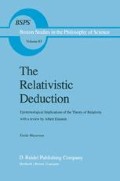Abstract
We have already called attention on several occasions to the fundamental observation that relativism, in substituting a different reality for sensible reality, is therefore obliged to some extent to call upon the imagination to represent this new reality. This constitutes a further limitation of the theory, one that has been little noted (at least if one discounts the protests of opponents who reject the theory out of hand because they claim that they are unable to imagine what it postulates). This limit has escaped notice because it is by nature imprecise and, moreover, as we are about to see, can never be fixed, given that we are unable to predict ahead of time what we may or may not be able to imagine under circumstances that are not fully actualized at the moment we make our judgment.
Access this chapter
Tax calculation will be finalised at checkout
Purchases are for personal use only
Preview
Unable to display preview. Download preview PDF.
Notes
This was noted by Henri Poincare well before the epoch that marked the advent of relativism. “Those who invented imaginaries”, says the great mathematician, “hardly suspected the advantage which would be obtained from them for the study of the real world; of this the name given them is proof sufficient” (La valeur de la science, Paris, s.d., p. 143 [The Value of Science, trans. Bruce Halsted (New York: Dover, 1958), p. 78]. General Vouillemin observes that at the present time “the symbol in question, although unfortunately christened imaginary, no longer surprises the mathematician any more than the symbol for a fraction, for example” Introduction la théorie d ’Einstein, Paris, 1922, p. 155).
Henri Marais similarly explains that, instead of following a “strictly logical method” to arrive at “the idea of any continuous multiplicity at all”, he will merely “generalize the properties of nonlinear multiplicities contained in a Euclidean space”, Perhaps one does not arrive in this fashion at “the most general idea of space possible, but this disadvantage is offset by the fact that the arguments refer more or less directly to familiar geometrical images and remain in contact with what may be called ’geometrical experiences’.” He adds: “Moreover, the theory of relativity uses only spatial notions that can be reached in this way” Introduction géométrique à l’étude de la relativité, Paris, 1923, p. 97). We saw above (§ § 21 and 47) that Marais is well aware of the realistic bias of relativism.
Henri Poincaré, ’Les géometries non-euelidiennes,’ Revue générale des sciences 2 (1891) 774. Poincaré came back to this conclusion several times, which proves how sure of it he was. Cf. his La science et I’hypothèse (Paris: Flammarion, s.d.), p. 93 [Science and Hypothesis, trans. W. J. Greenstreet (New York: Dover, 1952), pp. 72–73], and La valeur de la science, p. 109. Poincaré’s argument had been anticipated by Lotze; cf. Bertrand Russell, An Essay on the Foundations of Geometry (Cambridge, 1897), pp. 99–100 (§92). The discrepancy between Poincare’s argument and the fundamental assumptions of the theory of relativity was pointed out by Eddington (STG 9–10).
Rights and permissions
Copyright information
© 1985 D. Reidel Publishing Company, Dordrecht, Holland
About this chapter
Cite this chapter
Meyerson, É. (1985). The Relativistic Imagination. In: The Relativistic Deduction. Boston Studies in the Philosophy of Science, vol 83. Springer, Dordrecht. https://doi.org/10.1007/978-94-009-5211-9_16
Download citation
DOI: https://doi.org/10.1007/978-94-009-5211-9_16
Publisher Name: Springer, Dordrecht
Print ISBN: 978-94-010-8805-3
Online ISBN: 978-94-009-5211-9
eBook Packages: Springer Book Archive

